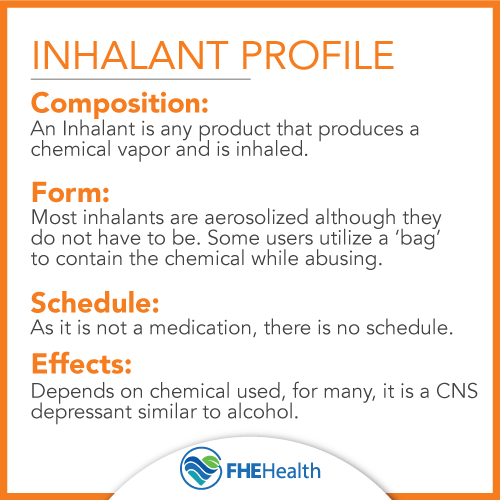Mark Halsey is a licensed therapist, founder, and chief editor of Clean Break Recovery. With over a decade of addiction treatment experience, Mark deeply understands...Read more
Inhaling certain substances to get a quick, intense high has become an increasingly popular way for people to get their fix. But are inhalants really stimulants? In this article, we’ll take a closer look at the effects of inhalants on the body and explore the dangers of using them. We’ll also examine the debate around whether or not inhalants are indeed stimulants. By the end, you should have a better understanding of inhalants and the potential risks associated with their use.

Inhalants – What are They and are They Stimulants?
Inhalants are chemical substances that, when inhaled, produce mood-altering effects. They are typically found in household products, such as paint thinner, gasoline, glue, and aerosol sprays. Inhalants are typically abused by young people as they are easy to obtain and relatively inexpensive. Inhalants can produce effects similar to alcohol or other stimulants, including feelings of euphoria and an increase in energy. There is a wide range of potential health risks associated with inhalants, including vomiting, nausea, headaches, dizziness, unconsciousness, and even death.
Types of Inhalants
Inhalants are divided into two categories: volatile solvents and aerosols. Volatile solvents are liquids that can easily evaporate and include substances such as paint thinner, nail polish remover, and gasoline. Aerosols are sprays that contain propellants, such as hairspray, deodorant, and cooking spray. Both types of inhalants can be inhaled directly from the container or through a rag soaked in the substance.
Short-Term Effects of Inhalants
When inhaled, inhalants quickly enter the lungs and bloodstream, producing effects within minutes. The short-term effects of inhalants include feelings of euphoria, increased energy, lightheadedness, and disorientation. Inhalants can also cause confusion, aggression, and impaired judgment. These effects typically last for several minutes, but can last for up to several hours.
Long-Term Effects of Inhalants
Inhalants can have serious long-term effects on the body. Prolonged inhalant use can cause damage to the brain, lungs, heart, and kidneys. It can also cause nerve damage, hearing loss, and liver failure. Inhalants can also damage the immune system and increase the risk of infections and cancer.
Are Inhalants Stimulants?
Inhalants can produce effects similar to alcohol and other stimulants, including feelings of euphoria and increased energy. However, inhalants are not considered to be stimulants in the traditional sense. Stimulants are drugs that affect the central nervous system and increase alertness, attention, and energy levels. Inhalants, on the other hand, produce their effects primarily through the inhalation of chemicals, and they do not affect the central nervous system in the same way that stimulants do.
Health Risks of Inhalant Abuse
Inhalant abuse is associated with a number of health risks. Inhalant use can cause dizziness, nausea, vomiting, headaches, and unconsciousness. Prolonged inhalant use can lead to permanent damage to the brain, lungs, heart, and other organs. Inhalants can also increase the risk of infections, cancer, and death.
Treating Inhalant Abuse
The best way to treat inhalant abuse is to seek professional help. Treatment typically involves counseling and support groups to help the individual cope with cravings and triggers for use. Additionally, medications may be prescribed to help reduce cravings and withdrawal symptoms.
Related Faq
What are Inhalants?
Inhalants are a wide range of products that are inhaled, usually through the nose or mouth, to produce a psychoactive effect. Examples of inhalants include aerosols, glue, paint, gasoline, lighter fluid, and cleaning products. Inhalants can be found in common household products, making them easily accessible and attractive to users.
What are the Effects of Inhalants?
The effects of inhalants vary depending on the type of inhalant being used. Generally, inhalants cause a short-lived, intense high that can last a few minutes or up to an hour. The high can cause feelings of euphoria, disorientation, dizziness, and slurred speech. Inhalants can also cause nausea, vomiting, decreased appetite, and fatigue.
Are Inhalants Stimulants?
No, inhalants are not considered stimulants. Stimulants are substances that act on the central nervous system to increase alertness and activity levels. In contrast, inhalants have a depressant effect on the central nervous system, causing decreased alertness and activity levels.
Are Inhalants Addictive?
Yes, inhalants can be addictive. Regular use of inhalants can lead to a physical and psychological dependence on them. Signs of an inhalant addiction include increased tolerance to the substance, cravings, and withdrawal symptoms.
What are the Long-Term Health Effects of Inhalant Abuse?
Long-term inhalant abuse can cause irreversible damage to the brain, heart, kidneys, liver, and lungs. It can also cause permanent hearing and vision damage, as well as damage to the central nervous system. In addition, long-term inhalant abuse can lead to serious mental health issues such as depression and anxiety.
What is the Treatment for Inhalant Abuse?
Treatment for inhalant abuse usually begins with medical detoxification, which helps the body to rid itself of the toxins from the inhalants. After detox, the individual can start therapy and counseling to help them understand the underlying causes of their addiction and learn new coping skills. Medication-assisted treatment may also be recommended to reduce cravings and ease withdrawal symptoms.
Stimulants, Depressants, and Hallucinogens #shorts #stimulant #hallucinogen
In conclusion, inhalants are not stimulants and they do not have stimulant effects. They can cause feelings of intoxication, euphoria, and excitement, but they are actually depressant drugs that slow down the central nervous system. Inhalants can be extremely dangerous and can cause serious health problems, including death, so they should be avoided.
Mark Halsey is a licensed therapist, founder, and chief editor of Clean Break Recovery. With over a decade of addiction treatment experience, Mark deeply understands the complex needs of those struggling with addiction and utilizes a comprehensive and holistic approach to address them. He is well-versed in traditional and innovative therapies, including cognitive-behavioral therapy, motivational interviewing, and mindfulness-based interventions.
More Posts